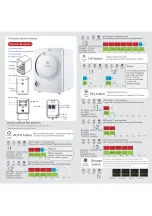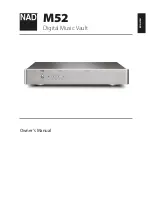
M
PUSH TOGGLES (M) IN
AND THEN UP
(SHOWN IN THE DOWN
POSITION HERE)
TURN WIRES UP
28
54
34**
33**
45**
52**
59
55
30
37
32**
L
53**
58
31
Fig. 16
33**
To remove
toggles,
Push IN,
Swing UP,
Ease OUT
19
308069
Service
CUT OFF TOPS OF
POPPETS AS
INDICATED BY
DOTTED LINES
0.145”
(3.7 mm)
CUTAWAY VIEW
54
58
35
Fig. 17
52**
33**
32**
33**
45**
53**
59
36**
4.
Install the poppets (52**) on the valve stems (45**).
Pull the exhaust valve poppets (53**) into the valve
actuator (35) and clip off the top part shown with dot-
ted lines. See Fig. 17.
5.
Install the grommets (32**) in the valve actuator (35).
Install the trip rod (54) in the piston (59). Place the trip
rod yoke (28) and valve actuator (35) on the trip rod.
Be sure the o–ring (36*) is in place and that the valve
actuator is supported by the spring clips (58), and
then reassemble the valve mechanism. See Fig. 16.
6.
Install the bottom adjusting nuts (33**) on the valve
stems (45**) and screw the stems into the grommets
(32**). Screw the top nuts (33**) on the stems.
Tighten the nuts (33) just enough to slightly
compress the grommet (32). Before installing the
lockwires (34**) in the adjusting nuts, use the special
gauge 171–818 to adjust the transfer valve so there
is 0.145 in. (3.7 mm) clearance between the poppets
(52**) and the seat when it is open. See Fig. 17.
WARNING
To reduce the risk of pinching or amputating your
fingers, always keep your fingers clear of the toggle
assemblies.
7.
Install the springs (31) and pivot pins (30) on the
toggle arms (37). Snap the toggles to the up position.
Refer to Fig. 16.
8.
Carefully lower the cylinder (51) over the piston (59)
and onto the base (55). Secure with the six screws
(25).
9.
Manually push on the piston rod (41) to move the pis-
ton (59) up as far as it will go. Grip the trip rod (54)
with padded pliers and screw the cylinder cap nut
(47) onto the trip rod. Pull the piston rod (41) to move
the piston downward. Be sure the o–ring (27) is in
place at the top of the cylinder (51), and then screw
the cap nut into the cylinder.
10. Screw the connecting rod (10) into the piston rod (41)
and secure with the pin (4*). Screw the riser tube (12)
into the base (55).
11. Install the muffler plates (20,40). Tighten the throat
packing nut (42) just until snug.
12. Connect an air hose and run the pump slowly [about
30 psi (2.1 bar)] to see that it operates smoothly.
13. Remount the pump and reconnect the ground wire.








































